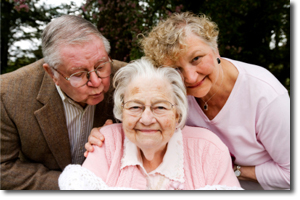News: Self Care Behaviors: Alzheimer's

Self Care Behaviors of Spouces Caring for Loved Ones with Alheimer's Disease...
In an article written by Karen E. Furlong and Judith Wuest in the journal, Qualitative Health Research, we learn that men and women who take care of spouses who have Alzheimer’s Disease don’t always take care of themselves. There are three stages of the process in which spouses as family caregivers find normalcy for themselves. Mastery of each stage is fleeting because of the up and down nature of the illness of Alzheimer’s.
Living from Within
The first stage, called “living from within”, is a process where family caregivers learn to identify, accept, and respond to their spouse’s changing behaviors related to Alzheimer’s. Three subprocesses of this first stage are that caregivers learn to be a caregiver, to mourn the changed relationship with their spouse, and to sacrifice their own care. On this last point, caregivers who do not perceive themselves worthy of self-care (e.g. eating right, exercising, or going to their doctor) do not accept or request support for self-care.
Reclaiming Self-Care
The second stage in the process of finding normalcy for self is reclaiming self-care. The outcomes of “living from within” can cause a caregiver to shift toward reclaiming self-care. This involves: escalating frustration, a critical worsening of an old health problem, or the onset of an acute health problem.
A person’s physical health is more likely than psychosocial health to cause family caregivers to reclaim their own self-care. Caregivers give little attention to their emotional difficulties, though, ironically, physical problems might result from a decline in emotional health.
Making Self-Care Happen
The third stage for family caregivers seeking normalcy is the act of making self-care happen. Three strategies for making self-care happen are: balancing, creating routines for both spouses and their caregivers, and getting away.
- Balancing involves setting limits on caregiving. When balancing, caregivers consider both the needs of their spouse and themselves when making decisions.
- Creating routines for both parties involves caregivers including their spouse in self-care activities. This might involve engaging in activities as a couple when the activity requires very little thinking. Examples are walking, gardening or camping. Some caregivers include their spouses in activities rather than missing the activity entirely. Routines that include both spouses and caregivers, however, are not as beneficial to caregivers as are activities that allow caregivers to get away for awhile.
- Getting away means that caregivers take part in activities they enjoy without the presence of their spouse. The purpose is to break away from their role as caregivers.
One implication of this study – and one that demands the immediate attention of health care professionals -- is that the discovery by family caregivers of their worthiness of self-care is an important milestone. If a person feels as though he or she is not worthy of self-care – rather than simply lacking interest in self-care - then the caregiver does not feel that self-care is a valid reason to seek help from others. This barrier to self-care can be corrected by health care professionals and knowing family members helping caregivers feel worthy of self-care.
What can you learn from this article?
Here are some Basic Self-Care tips for Family Caregivers:
- Eat regular balanced meals.
- Take time to exercise each day; walking, playing in a sport, swimming, group exercise.
- Keep regular appointmentss with your doctor and dentist.
- If you develop a health problem seek medical attention.
- Take your own medications routinely.
- Take time to enjoy your relationships with others.
Furlong, K.E., Wuest, J. (2008). Self-Care Behaviors of Spouses Caring for Significant Others with Alzheimer’s Disease. Qual Health Res vol. 18 no. 12:pages 1662-1672 http://qhr.sagepub.com/content/18/12/1662.abstract